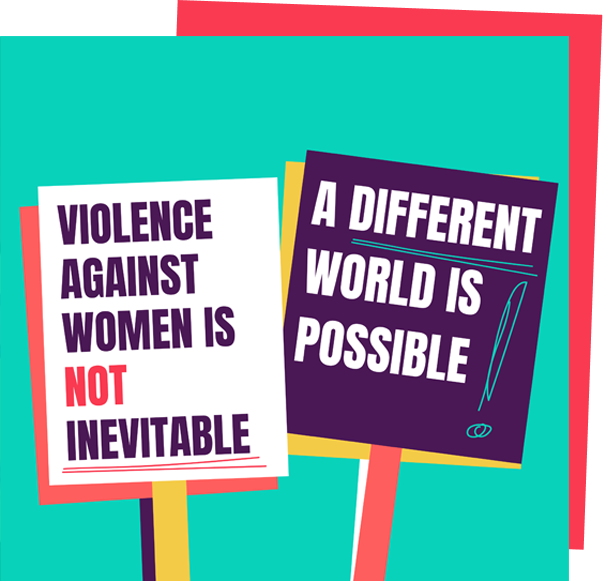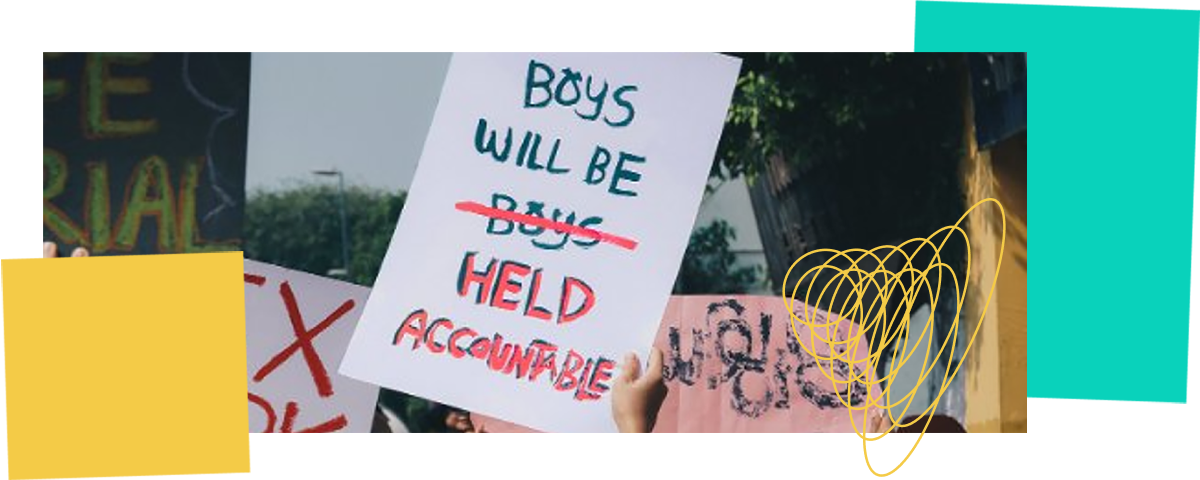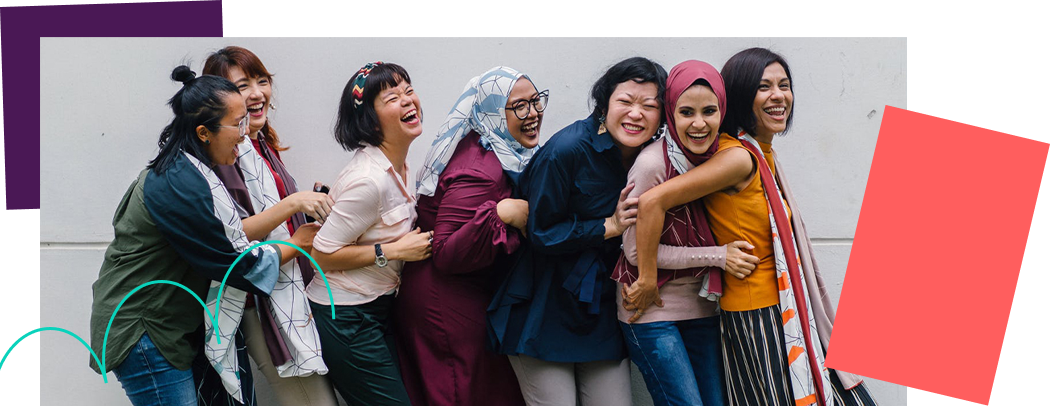OUR STORY
By preventing abuse and supporting women and girls, we can build a different world.


Violence against women and girls is widespread and linked to women’s inequality, but there is concrete action that can be taken to end it and to prevent it, and everyone has a role to play.
For many years the main response to violence against women and girls was limited to changing the way it was handled by the police and courts; a ‘criminal justice response’. The idea of preventing rape, domestic violence, harassment or FGM was given little attention.
But following campaigning and initiatives by women’s rights organisations around the world, we are starting to see prevention feature in policymakers’ thinking.
Preventing violence includes work across many areas of our public services and community life:
Gender equality
Violence against women and girls is closely related to women’s inequality. So to prevent violence we must improve socio-economic position. This includes equal pay, fair housing and welfare policies, and better employment, education and training for women and girls. And we need to address inequalities related to race and ethnicity, disability, sexuality and gender identity to reduce further inequality among women.
Education
We cannot prevent violence against women and girls without shifting the attitudes that drive this behaviour. This means giving children and young people the information they need about sexual consent and healthy, respectful relationships as part of a ‘whole school approach’ to ending violence against women and girls, informing them about inequality and equipping them with the knowledge to treat others with respect and dignity.
Public spaces
Sexual harassment has a huge impact on women and girls. It forces women to do ‘safety work’ – avoiding coming home late on their own, paying for taxis and taking the longer but better lit route home. For women to be truly free, harassment and abuse in public has to stop. Public campaigns like the UK Government’s Disrespect NoBody are an attempt to change attitudes to sexual harassment and make it unacceptable, like past campaigns on issues like drink driving. These campaigns must take an intersectional approach, with Black and minoritised women’s experiences of sexual harassment named and sexist racism challenged.
Work with perpetrators
Men who commit violence against women and girls are known to do so again and again and often against a series of women. Education, equality and the challenging of sexual harassment will prevent some perpetrators from harming women and girls, but we also need high quality interventions that prevent known perpetrators from harming more women. Organisations like Respect are leading this very challenging and essential work.
Tackle harmful media
Media companies, advertisers and social media platforms must take responsibility for their representation of women and girls. This means using dignified imagery that doesn’t harm or retraumatise survivors, and images featuring diverse women and girls. It also means challenging harmful framing, including headlines and narratives that minimise, trivialise or excuse violence. The media has a powerful role in shaping our attitudes and beliefs, and media companies must be held to the highest standards of accountability.
Speak out
Everyone in public life has a role to play in speaking out about violence against women and girls and its consequences. Those elected at local and national government level, business leaders, people in the arts and public and voluntary sector leaders must recognise where ending violence against women and girls fits into their responsibilities. Like other civil rights struggles, this is everyone’s business.
Support all survivors of abuse
A society that is truly working towards ending and preventing violence against women and girls will see more survivors of abuse coming forward to seek support and justice. We must ensure there are enough support services for every woman and girl who seeks them at the point of demand.

The response to violence against women and girls, in the UK and around the world, has emerged from grassroots groups and individuals responding to the needs of women and girls.
Our movement has built refuges for women and their children needing to flee violent men, in empty and abandoned houses. We’ve created rape counselling, which is woman-centred and never blames the survivor. Black and minoritised women created support provided ‘by and for’ others marginalised by race, religion and migration status, based on our direct understanding of the dynamics of abuse different women face. We have sought out women in immigration detention who have been trafficked and built legal advocacy and therapeutic support tailored to their needs.
These needs do not always fit easily into what we expect from the police, our health service, our schools or other public services. But when women experience violence because we are women, we have a right to support which helps us recover.
Access to quality, specialist support is integral to recovery from violence and an essential part of justice for survivors.
In the UK, as high profile cases come to light and society becomes less tolerant of abuse, more and more survivors are coming forward in search of support for both recent and non-recent abuse. This has exposed not only the patchwork of services available to survivors around the UK, but also the strain on existing services, which are often unable to keep up with demand.
In addition, access to legal aid has plummeted, so survivors are often unable to obtain legal advice and representation. This means that women often are more reliant than ever on the holistic, wraparound support that many frontline organisations provide.
Across the country, women-led support services work 24 hours a day to provide emergency accommodation for women and children fleeing violent partners, counsel survivors of sexual violence, support girls and women facing forced marriage, give legal advice and support to women seeking asylum or in immigration detention following gender-based violence – and much, much more.
But this is not all. Our knowledge and ‘frontline’ experience means we are often the best local experts on how and why abuse happens and what can be done about it – so we are called on to provide training for police, health workers, teachers and others. We run interventions on sexual consent, FGM and forced marriage in schools. We advise police and crime commissioners, as well as health commissioners and local councils on their community’s needs and how to meet them.
The right to support is established in UK and international law. The Human Rights Act and the Equality Act say that women’s right to live free from discrimination and harassment mean we must be able to access help when we need it. EVAW is calling for the UK to ratify the Istanbul Convention on violence against women and girls which sets out the best standard of guaranteed support during and after abuse.
But funding cuts and processes of ‘competitive tendering’ at local level (when local councils open a contract for running services to a bidding process) are putting women’s specialist support services under enormous pressure. Many have closed or reduced in size since 2011 – just as demand has been increasing. If critical women’s support services that have been built up over decades are lost, not only will women and children be put at risk, but we will also lose vital expertise in local communities that is needed to end VAWG.

Violence against women and girls is not inevitable. We believe that a different world is possible; a world where women and girls live equally alongside men, free from harassment and violence.
With political will, investment and collaboration, we know we can create a society in which no one faces the threat of violence because of their gender.
We envision a society in which women and girls of all backgrounds live free from violence and the threat of it. This means women and girls taking up space, opportunities and resources, living their lives to their full potential. But we can’t get there without tackling the violence that props up inequality and narrows our options/world/possibilities.
To create the change we want to see, we need to shift the attitudes that drive violence against women and girls and minimise this harm as a normal part of life. We believe this is best done through public campaigning, working with the media and through education in schools. But we also need to address the inequality underpinning these harmful attitudes and behaviours – this reaches beyond gender and across other forms of inequality including race, ethnicity, migration status, disability, sexuality and more.
While our coalition has existed since 2005, our members have shaped and led the women’s rights movement for much longer – having named and challenged men’s violence against women and organised support services and resistance. We believe it is not inevitable and that we can prevent it. Our work continues and builds upon this legacy, bringing in more women and ensuring our movement is intersectional and relevant to women’s daily realities.
We have exposed gaps in policy, law and practice and shape the response to VAWG. But we still have work to do. We have a vision of change across all parts of government and our public services, as well as in popular culture and narratives, which would help build a society that truly rejects violence against women and girls. The key to this is the commitment to specific and concrete efforts to prevent violence against women and girls.
